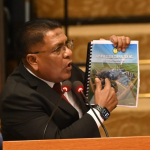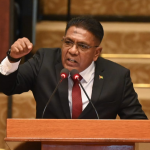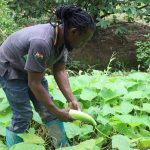Representatives from the various Caribbean countries today gathered at the Ramada Georgetown Princess Hotel, for the Fourteenth Meeting of the Caribbean Fisheries Forum. The two-day event is aimed at compiling regional recommendations on the way forward for the Ministerial Council.
It is also expected to create leeway for discussions on the fishery industry, primarily identifying similar challenges among member states, along with solutions.
Speaking at the opening ceremony, Minister of Agriculture, Noel Holder noted that, “the fisheries sector plays an important and direct role in national food security.”
In the Caribbean, the fisheries and aquaculture sector is a major economic contributor to domestic markets. It is also a significant employer with about 116,000 people directly employed and over 225,000 indirectly employed.

A section of the international participants at the Fourteenth Meeting of the Caribbean Fisheries Forum
The Minister also highlighted that the sector contributes significantly to the country’s foreign currency earning. “We here in Guyana can boast that the fisheries sub-sector contributes about 9.4% to agriculture GDP; it collects about GY$30.7M in revenue from fees from licences; and it adds approximately US$75M annually to the foreign currency earnings through exports. Furthermore, the fishing industry employs approximately 15,000 people with 4,000 to 5,600 persons being directly employed in fishing, with many more benefiting indirectly through fishing related industries,” he said.
Further, the Agriculture Minister underscored the health benefits of fish and fish products which he said are causing global demands. He said global marine production is being pressured to supply this demand with aquaculture, and “It is our duty to supply wholesome fish and fish products to meet this demand; however we must ensure that it is done in a sustainable way so that future generations can enjoy the same benefits we now have,” he said.
Guyana’s interventions
Minister Holder told the gathering that Guyana is committed to the sustainable management and advancement of the fisheries sector, and is committed to working with its partners to ensure that “we fish responsibly and practice sustainable fishing practices.”
Some of Guyana’s initiatives he said include: introduction of a harvest control rule where trawlers are allowed to fish for only a certain amount of days annually; the installation of by-catch reduction devices and Turtle Exclusion Devices on all trawlers, the use of Vessel Monitoring Systems on the trawling fleet so that they can be monitored on a 24-hour basis and the formation of a Seabob Working Group, which comprises members of the Fisheries Department and stakeholders from the Trawlers’ Association.

Justin Rennie, outgoing Chairman, Caribbean Fisheries Forum (CFF) addressing the gathering at the forum
Further, the fisheries industry will be increasing monitoring of artisanal vessels to ensure that they are in compliance with the rules and regulations as indicated in the Fisheries Act of 2002. This is expected to reduce accidents and robbery at sea. Coast Guard ranks will also be patrolling in the Exclusive Economic Zone.
Guyana has acceded to the Port State Measures agreement and thus the country will benefit from training in this aspect from FAO in the coming week.
Challenges
The Minister noted that apart from the dwindling marine resources, the sector faces other challenges. “Adverse climatic conditions and the increasing presence of seaweed, hampers the fisherfolks’ ability to fish or make it more dangerous to ply their trade. Illegal, unregulated and unreported fishing and robbery at sea also pose serious challenges,” he said.
“I am happy that the Caribbean Community Common Fisheries Policy (CCCFP) is authorised for implementation. This policy, I believe, is aimed at fostering greater harmonisation across the Caribbean in the sustainable management and development of the region’s fisheries and aquaculture resources, with special emphasis on promoting the most efficient use of shared resources, while aiming to improve food security and reducing poverty in the region,” Minister Holder reiterated.
Aquaculture
The Minister noted that it is critical to look into the role of aquaculture in filling the global fish supply-demand gap and reduce the pressure on capture fisheries.
“Production of fish from aquaculture has exploded in the past 20 years and continues to expand around the world. However, in Guyana, like many other CRFM members, aquaculture is proving to be struggling to take off commercially, because of numerous challenges, such as the high cost of imported feed and other inputs such as fingerling production. Also, the presence of non-tariff barriers in entering countries even within the CARICOM member states continue to hamper progress, as we know it is demand that develops any industry,” he added.
International projections show that developing countries will consume and produce a much greater share of the world’s fish in the future, and trade in fish commodities will also increase. The Minister said “we in the Caribbean need to ensure small producers are not excluded from rapidly growing export markets. We need to find cost effective ways to reduce cost of production and to facilitate affordable certification of food safety and environmentally sound production.”





